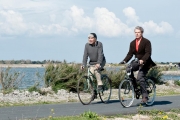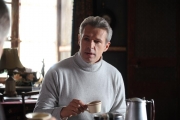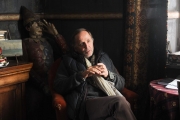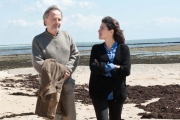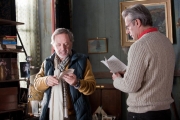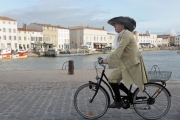Synopsis
Despite his great acting talent, Serge Tanneur has withdrawn from the show business world without regrets. For three years now, he has been living alone on Île de Ré, spending most of his time crisscrossing the wind-battered countryside on his bike. When his colleague Gauthier Valence shows up on the island, willing to persuade him to play the lead role in his new adaptation of Molière’s Misanthrope, Serge turns the offer down. Yet, he is tempted by the adventure and gives Gauthier a chance to convince him: he accepts to rehearse the play with him for five days…
Credits
Director: Philippe Le Guay
Screenplay: Philippe Le Guay
Producer: Anne-Dominique Toussaint
Cast
Fabrice Luchini • Lambert Wilson
Maya Sansa • Laurie Bordesoules
Schedule & Presentation
![]() Presentation by and discussion with director and screenwriter Philippe Le Guay
Presentation by and discussion with director and screenwriter Philippe Le Guay
More information
Choose a picture to see the filmography (source : IMDB)
![]()
Alceste à bicyclette came about in an unusual way.
I was preparing for The Women of the 6th floor and I was trying to obtain Fabrice Luchini’s agreement to play the lead. I arrived on Île de Ré to give him a copy of the text, which I put on my bike-rack and headed off to meet him by bicycle. But I got lost in the marsh. Fabrice came to find me, also by bike. We cut across the marsh and I told him: “You are a real misanthrope, holed up in your retreat!” And immediately, he started reciting the beginning of Molière’s play, The Misanthrope. And right there, all of a sudden I saw a film, and a title came to me: Alceste à bicyclette. The story of a reclusive actor on Île de Ré.
During the play’s rehearsals, Serge and Gauthier have opposing points of view on the text of The Misanthrope.
I wanted them to continually come back to the same tirades, so you see the text holding out on them, and have them criticizing each other. That is why I decided to stick to Act 1, Scene 1. It sums up the philosophical positions of Alceste and Philinte, the eternal problem of the choice between truth and indulgence. I did not want to stray around through the whole play and do a succession of selected excerpts.
In any case, the text is so inexhaustible that you do not grow tired of hearing it over and over. It is the opposite of the cliché according to which the classics need to be “dusted off”. Here, it is Molière who dusts us off.
Each rehearsal is filmed in a very specific way.
There are eight rehearsals and they each have a different stake. In each case I had to come up with a specific directorial approach to bring this out. I thought a lot about the duels in Barry Lindon by Stanley Kubrick, or those in Scaramouche, the magnificent film by George Sidney. From one combat to another, the advantage changes hands.



